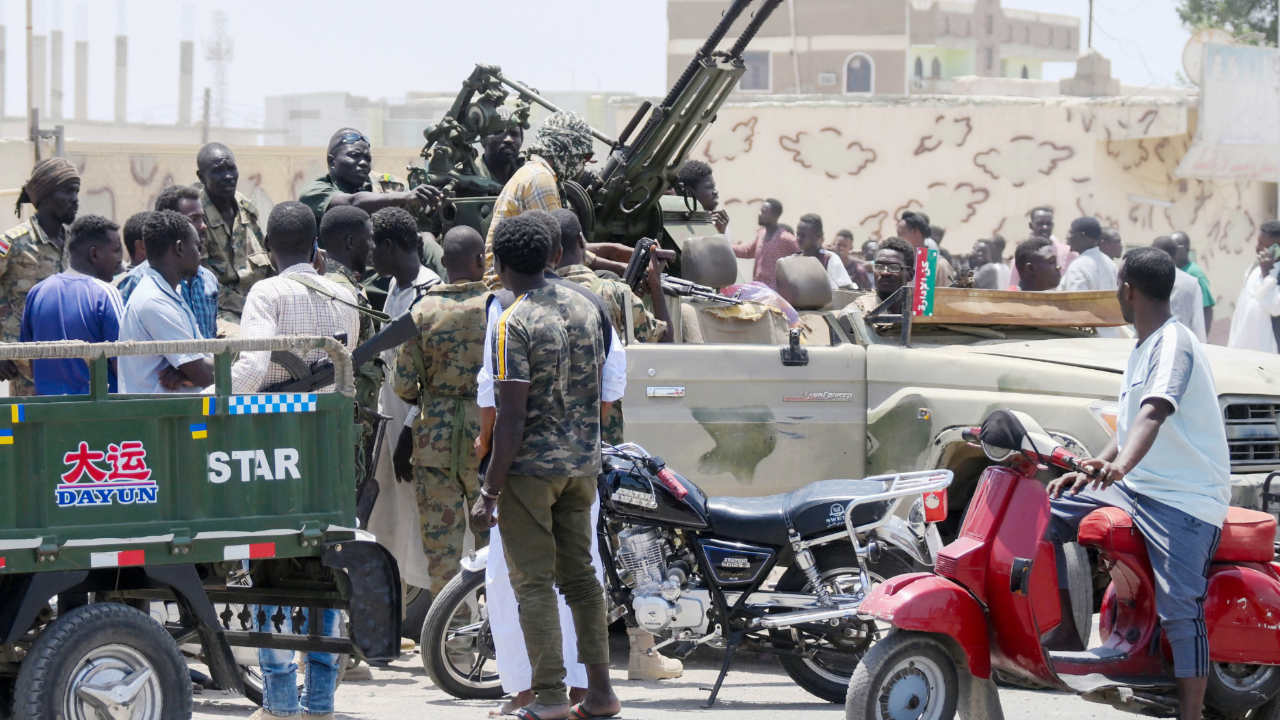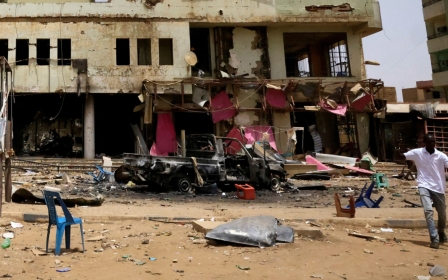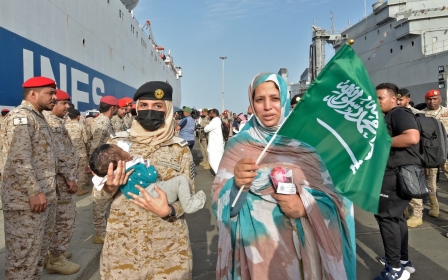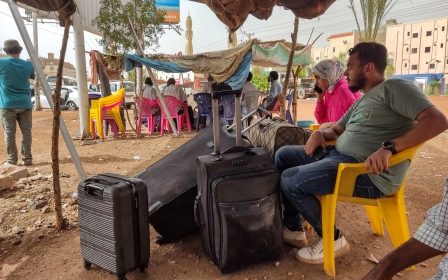Sudan: Conflict tests limits of Gulf powers' new diplomacy
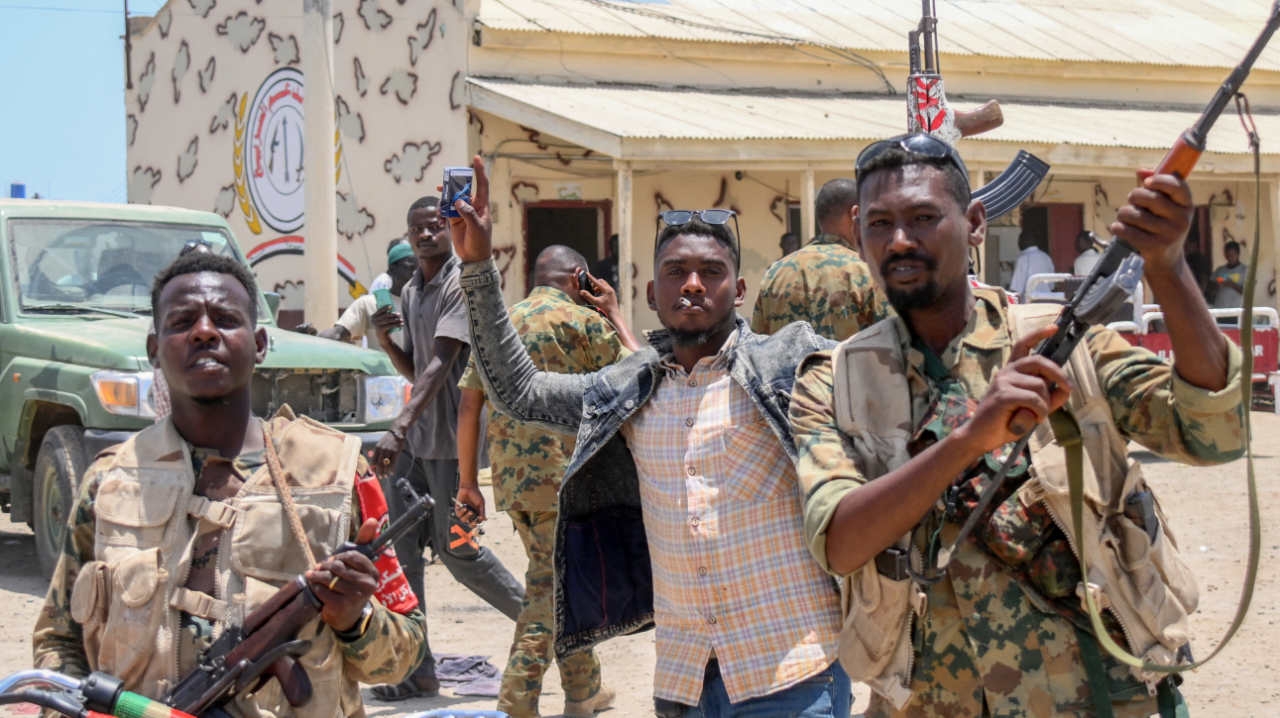
The breakout of war in Sudan is testing Gulf powers’ willingness to pursue a more subtle form of statecraft after nearly a decade of heated, and often tortuous, intervention in regional conflicts.
The images of Sudanese army forces led by General Abdel Fattah al-Burhan and paramilitary fighters commanded by his erstwhile ally, Mohamed Hamdan Dagalo, battling it out in the streets of Khartoum is in stark contrast to recent news headlines from the region.
In Yemen, Saudi Arabia has been swapping prisoners with the Iran-aligned Houthis as it looks to wind down a war that earned it criticism in the West and distracted from Crown Prince Mohammed Bin Salman’s economic reform agenda.
The UAE and Saudi Arabia have both patched up ties with Iran, having pivoted from arming the opposition to Syrian President Bashar al-Assad - Tehran’s ally - to welcoming him back into the Arab fold. Even Libya, which remains divided by rival armed camps, has seen fighting subside.
“The Gulf states look at Sudan and just want this thing settled,” Ken Katzman, a senior advisor at the Soufan Group, told Middle East Eye. “They feel they can deal with whoever comes out on top, but what they don’t need is escalation.”
New MEE newsletter: Jerusalem Dispatch
Sign up to get the latest insights and analysis on Israel-Palestine, alongside Turkey Unpacked and other MEE newsletters
The conflict in Sudan is particularly ill-timed for Saudi Arabia, experts say, because Crown Prince Mohammed Bin Salman’s plans to diversify his fossil fuel-dependent economy rest heavily on the Red Sea coast.
Saudi’s northern coastline is destined to be the future home of Neom, a $500bn futuristic mega-city. Just days before fighting in Sudan erupted, Riyadh announced plans for two special economic zones on the Red Sea.
'Syria on the Red Sea'
“The last thing Saudi Arabia needs right now is a Syria on the Red Sea,” Aziz Alghashian, a Saudi foreign policy researcher based in Riyadh, told Middle East Eye.
“Saudi really wants Sudan to be stable. If there is an unstable Sudan, the projects on the Red Sea will not fulfill their potential - that is the anxiety in Riyadh right now.”
While analysts attribute Saudi’s proximity to Sudan as one reason it is taking a more cautious approach to the conflict, they say a deeper shift is also at play in the royal palace.
In 2015, Saudi Arabia’s then-brash defence minister, Mohammed Bin Salman, led his country into a deadly war against Houthi rebels in Yemen. Despite launching thousands of air strikes on the impoverished country, the coalition was unable to oust the group.
Torbjorn Solvedt, an analyst with risk firm Verisk Maplecroft, says Riyadh appears to have learned the limits of its aggressive foreign policy from Yemen.
"The cautious shift owes a lot to the lessons learned from the failed intervention in Yemen. The failure to push back Iranian influence in the region has also tilted Saudi Arabia toward a more conciliatory stance," he told MEE.
The 2019 removal of Omar al-Bashir gave Riyadh an opportunity to deepen its foothold in its strategic, mineral-rich neighbour. Last year, it announced plans to invest $3bn in Sudan in sectors from agriculture, to mining and infrastructure.
While the Saudis have cultivated ties to army chief Burhan, they also have a line to Rapid Support Forces (RSF) Commander Dagalo, who goes by the nickname, Hemeti. Along with the US, UK and UAE, they sit on the ‘Quad’, a group that has voiced support for Sudan’s democratic transition.
Jacqueline Burns, a former advisor to the US special envoy for Sudan, told MEE that Riyadh likely wants to see a unified military under the Sudanese army, a position favouring Burhan that puts them closer in step with Egypt, which Burns says is clearly backing the army. At the same time, Burns says, they have been “hedging” with Hemeti.
Saudi Arabia's man in Khartoum
Saudi Arabia’s main emissary is its ambassador, Ali Hassan Jaafar. Posted to Sudan since 2017, Jaafar previously served as Riyadh’s ambassador to Russia and is regarded as one of the kingdom’s more skilled diplomats.
“He has been very instrumental in talking to every party. The Saudis can rely on someone on the ground who knows every actor,” Benjamin Auge, an African specialist at the French Institute of International Relations, told MEE.
As fighting flares in Sudan, Saudi Arabia appears to be positioning itself as a mediator. The Saudis are working with US backing to bring Burhan and Hemeti together for talks in Riyadh in the coming weeks. The efforts were first reported by Sky News Arabic and confirmed to MEE by two sources with knowledge of the matter.
On Friday, Saudi’s ambassador to the UK, Khalid bin Bandar, talked up Riyadh’s mediator role saying, “We have good relationships with as many people as we could. When you are engaging with people, you can then use it with people when you need to…the Middle East is not short of conflicts. We do not need more,” he told the BBC.
The steady stream of western expats and Sudanese refugees fleeing to safety in Saudi Arabia has also helped bolster Riyadh’s neutral image. US President Joe Biden thanked Saudi Arabia for its help in evacuating US diplomats.
Some analysts say Riyadh is trying to take a page out of Qatar’s book when it won plaudits for helping with the Afghanistan withdrawal. “MBS is trimming his sails. He sees an opportunity to appear as a moderate by emphasising the role evacuating people,” Katzman told MEE.
What Auge describes as Saudi Arabia’s “cautious” approach to the conflict contrasts with the UAE’s “daring” orientation.
When clients go rogue
The Emirates is seen as close to Hemeti, who they paid to provide troops to fight in Yemen. His RSF is also suspected of bolstering the ranks of Libyan military chief and Emirati ally, Khalifa Haftar, who the Wall Street Journal reported sent ammunition to Hemeti amid recent fighting.
In his tweets, Hemeti justified the fighting by claiming his forces were battling “radical Islamists”, a comment Alghashian said is likely a nod to the UAE. At the same time, the military leader, accused of war crimes in Darfur, has coached his battle against the army in democracy promotion.
After the 2011 Arab Spring, the UAE and Saudi Arabia imposed a blockade against Qatar over allegations it supported the Muslim Brotherhood, which they view as a threat to their rule. They accused Qatar of funding “terrorists”, a charge Doha denied. The Gulf states have since moved to patch up ties.
'A lot of young men joined the RSF over the army to simply benefit from its superior pay level'
- Jonas Horner, Sudan analyst
Hemeti spent two weeks in the UAE in February where he met with senior Emirati leaders including the country’s vice president, Sheikh Mansour bin Zayed Al Nahyan.
Jonas Horner, an independent Sudan analyst, says the UAE has backed Hemeti, but may be experiencing some buyer's remorse as fighting rages in Sudan.
“The UAE may well be surprised by the outbreak of fighting. While they have maintained a relationship with Hemeti that has enabled his financial and military strength, I don't think it was with the intention of empowering him to fight a war with the Sudanese Armed Forces,” he told MEE.
Both Saudi Arabia and the UAE have invested in Sudan, including large-scale agriculture projects, but Solvedt, with Verisk Maplecroft, says Riyadh’s footprint is lighter.
Abu Dhabi has been staking out a maritime network stretching from the Yemeni island of Socotra to the unrecognised Horn of Africa statelet, Somaliland.
In December, Abu Dhabi Ports Group signed a deal to develop a new $6bn port 200 miles north of Port Sudan. The project underlines the tangled web of Emirati commercial and geopolitical interests in Sudan. Abu Dhabi Ports is owned by ADQ, a holding company run by the UAE’s sun-glass-wearing national security chief, Sheikh Tahnoon bin Zayed Al Nahyan.
“The Gulf states have spread their chips around the table backing Burhan and Hemeti, but at the end of the day, the UAE is probably more concerned about who the direct winner is,” Katzman told MEE.
'Sudan's generals at the table'
The UAE’s risk appetite is likely going to be tested. On Thursday, a partial ceasefire was extended for an additional 72 hours, but fighting continued throughout Khartoum and much of the country. Many analysts predict a protracted conflict, where money and resources are going to be needed.
Hemeti’s paramilitary forces have taken to looting, but they are also better paid than their Sudanese army opponents, Horner told MEE.
“A lot of young men joined the RSF over the army to simply benefit from its superior pay level,” he said. “The RSF are particularly vulnerable to financial pressure.”
Two weeks into the fighting there is scant sign Hemeti’s cashflow has been cut off, a form of inaction that Horner said could be viewed as “policy”.
Qatar has also thrown itself into the mix. Analysts say they have been looking to recoup their influence in Sudan since the overthrow of Bashir, who refused to sign on to Saudi and Emirati efforts to isolate Doha. In March, Burhan travelled to Doha to discuss military cooperation with the Qatari defence chief.
But Horner says the main powers that could exert pressure on the rival Sudanese generals are Saudi Arabia, the UAE, and Egypt. “They are in a position to bring these generals to the table to halt the conflict by using their financial leverage.”
This article is available in French on Middle East Eye French edition.
Middle East Eye delivers independent and unrivalled coverage and analysis of the Middle East, North Africa and beyond. To learn more about republishing this content and the associated fees, please fill out this form. More about MEE can be found here.



